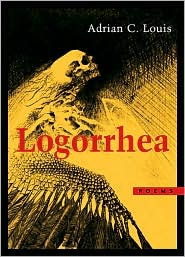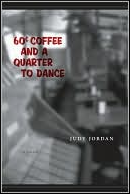Winter 2007
Table of Contents - Vol. III, No. 4
Poetry Essays Fiction Book Reviews
Adrian C. Louis, Logorrhea, Northwestern University Press, ISBN-13: 9780810151789, 120 pages, 2006, $14.95.
As the self-mocking title implies, Louis’ 12th book of poetry is an opening up of the mind, a venting on a number of different subjects, some which will be familiar to long-time readers and some which will be new. These poems strike me as collection of postcards from the edge—the edge of the rez, the edge of academia, the edge of civilized America, and the edge of a bar stool— all written by an aging half-breed Indian teaching at a small college to earn his paycheck. Often they are more intimate than is, and that is by design. In poem after poem just as he pulls himself out of slothful complacency, he urges the same of his readers— to open a critical eye to their own lives and all that surrounds them.
Themes covered include his Indian ancestry, identity, alcoholism, poverty, hopelessness, hypocrisy, lost loves, and more recently the encroachment of old age, and ever sharper criticisms of intellectualism and academia. He is not bashful about talking jabs at politicians of all persuasions, especially the current administration, and almost always couches his poems in a mordant sense of humor.
Some critics have likened Louis to a Bukowski with a strong sense of community. While there are similarities in the use of profane, conversational language and explicit scenes, Louis is the more polished poet, and this sense of community is always at the center of his work. One poem, in particular, stands out for me as a characteristic mixing of the sacred religious past with the profane present:
Deer People near Platte, South Dakota
They stand on their tiptoes
taking newly minted leaves
from low-hanging branches.
I'm only fifteen feet away
and I know they know
I'm leering at them.
My car window is open
to vent the cigarette smoke.
Hey, my relatives, I whisper.
Their ears twitch and stiffen.
They give me a scornful look
and continue green munching.
Oh, my sweet darlings,
when and why did I stray
from the loving herd? How
did I become this impotent
creature with three weak legs?
Louis is at his best when he is most brutally honest, tackles his subject head-on and avoids an occasionally overwrought tendency for verbal circumlocution. One of the most stunning, heartbreaking and well-crafted poems in Logorrhea is addressed to his wife, an Alzheimer's patient in a nursing home:
Note To a Pine Ridge Girl Who Can No Longer ReadI keep dreaming these dreams
where I lose you, literally lose
you like misplaced car keys
and wake up sweating and
call and cuss, mutter for you
to reveal yourself, not in dream
but in my wide-awake frustration.
Thank God my closest neighbors
are simple Hmong who think all
Americans are crazed cannibals.
Ah, sweet mumbling darling,
I’ve been offered a great job
far from these mindless Plains
at a white castle of utmost
pay and supreme prestige.
Oh love, what are we to do?
A decade of intense meds
has made your face puffy.
I don’t look any better, but
you cannot talk—little light
breaks in your eyes when I visit.
The wasicu staff tells me your
chanli will now be cut off
because you keep putting
the lit end in your mouth.
Pain and indignity floods
our being and our memory.
I can’t tell you how many times
we’ve sat holding hands while
you’ve dirtied your diapers.
Two of your toes have curled
into claws—two of your fingers
did until they chopped them off.
God forgive me for okaying that.
When I catch your attention
and stand before you and do
the twist, you sometimes still
smile crazily, my little one.
That you smile at my dance
of tears is enough, my love.
Dearest woman, that is enough.
That is all I need. That’s plenty.
Forgive me once and again
for thinking of only myself.
Everything is clear now and
I will not be crawling away to
some new life at this late date.
I’ll keep playing the game
for the paycheck and
you, my love—
eternal.
Logorrhea may be uneven from start to finish, but it is unquestionably honest, sincere and truthful, and its power arises from the harsh, hard-won truths it reveals. Louis looks the life he knows dead in the eye, and attempts to capture its cruel beauty and futility. This book doesn't have the spleen of some of his earlier efforts, but it is still worth the investment.
Judy Jordan, 60 Cent Coffee And A Quarter To Dance: A Poem, Louisiana State University Press, ISBN-13: 9780807129951, 64 pages, 2005, $17.95.
60 Cent Coffee, Jordan’s second volume of poetry, is a book length poem that chronicles a time in her life when she was homeless, working as a pizza deliveryman at a Greek immigrant-owned restaurant. It marks a radical departure from the rural landscapes of Carolina Ghost Woods, Its daring narrative skillfully weaves together the lives and histories of Jordan, and the experiences of her coworkers, the street walkers and the homeless with whom she shares a common plight. The chorus of voices blends into a haunting melody that records the hopes, dreams and quiet alienation of those living in the underbelly of society.
Three characters dominate the poem: Jordan, the narrator, Chris, the Greek immigrant cook, whose boyhood was scared by Nazi occupation and civil war, and Princess, the prostitute, whose compatriots die young from disease, drug addiction, or at the hands of johns or pimps. Their lives move through varying degrees of misery and poverty to intersect in time at the restaurant, and Jordan gives them voice to tell their stories to the world. She describes her own situation at the time:
There will be day here but it’s hard to rememberslumped in the shadows of shadows
in a fight for one-eyed sleep.
Strange to know that with the first scream of birds
I will see that only yards from where I scrunch
in the front seat of my pickup are houses.
Strange to wake
to a six-battery, steel migraine-maker,
lighted blindness
and the shift and creak of four policemen
knocking on my truck window.
From sleep to the humiliation of being homeless
in a dark so thick nothing makes its way through
certainly not their words, not their move on, move on.
Jordan paints a graphic portrait of the short, dangerous lives of the parking lot prostitutes through the voice of Princess, the irony of whose pseudonym should not go unnoticed. Some of these passages lapse into the stereotypical and mark the weak point of the book. But some remain freshly poetic as she describes her own life and the lives of her friends as they are extinguished like brief candles:
It is with needle and ink the hour before lights outthat I tell this story of America:
Princess bent over her left hand
her cellmate carving a cross in the web of flesh
between forefinger and thumb
and later Princess on the streets again
her needle-scarred skin, syringe of blood,
fire-rush of it through her veins,
faded cross, and on her shoulder's blade
a heart, the initials D and B, the same blurred blue.
But what story is this, she hunched against
the brick buildings, the smokestacks
and the boxcar's lonely clicking.
A story precise as a machine, empty as black windows,
stories of gutters and moldy cellars
and what lies under the city
with the muscled cords of telephone lines
and hollow entrails of sewer slime and gas pipes,
hundreds of miles of dry coughs and slag,
scorched copper and iron calling into the echoing dark,
Princess above it all,
shirt riding up over the blank eye of her navel,
smoke from her cigarette
rising sure as an angel toward eternity.
Perhaps the most compelling voice in this litany of voices is that of Chris the Greek immigrant cook as he speaks of his struggles to survive both in the US and in his boyhood through the Nazi occupation of Greece. Jordan provides Chris with some of the most horrific, yet beautifully written passages in the book:
Athens, February, 1942, sittingon the wooden step, streets empty
when you touch my knee.
Lead balloons pour from your mouth
and rise to the steel underbelly of the sky.
So you have died my friend.
Scratched from yourself, stretched out on the street,
raisins forced between your lips.
Now you wear a wreath of ilex
and carry a string of rats' heads slung across your back.
You were always the generous one
but I know better than to eat food
offered by the dead and cross my fingers
against the omen of you and your meal of rats.
So now you are just one more soul
zigged open by the blue light of hunger
and handed over to the indifferent care of the gods.
Death has whittle you razor-edged.
It has whittled me too only I am not dead.
Unbelieving I say this out loud.
Flares like glow worms crawling from my mouth,
my hands turn to spades and you say There are graves to be dug.
Have you nothing more to say when only last month we bled
wrist to wrist and joined the packs of children grounging
the rocks of Hymettus for horta, dinner's grass and weeds.
It's a new day. There is no forgiveness.
I could go on and on quoting passages from this beautiful hymn to the dispossessed. In many ways it is a modern-day Song of Myself focused on those living on the margins of society. I don't think it is a book that will appeal to everyone, but for those who enjoy narrative poetry and have the time and patience to read the book in one sitting I heartily recommend it. It could only have been written by someone who's lived it.
© Jim Doss


